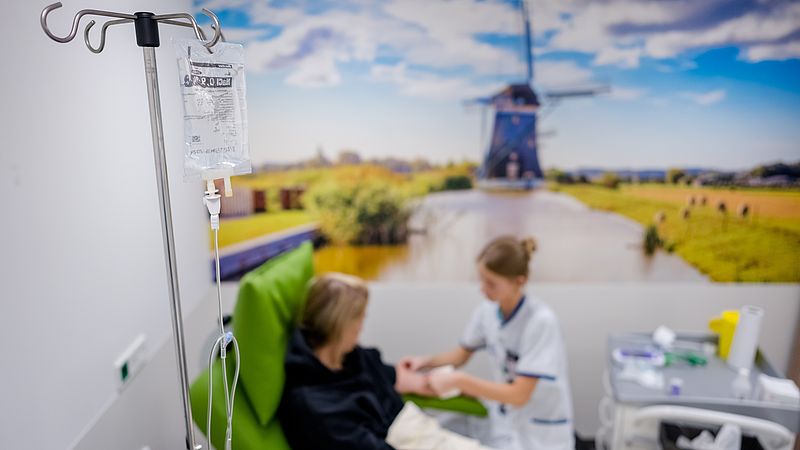According to patients, one of the worst side effects of cancer treatments: loss of the sense of taste and smell. They lose their pleasure in eating, have a bad taste in their mouth, or sometimes even stop eating altogether. More research is now being conducted in this regard.
Researchers at UMCG now receive support of €6.6 million from the Dutch Cancer Society. 700,000 of them go to research conducted by internal oncologist Jaco de Haan. De Haan will conduct research on loss of taste and smell during cancer treatment: “After baldness, patients often find that loss of taste is the worst side effect of cancer treatments.”
Pizza or french fries
In 2018, Claudia Vermeulen received chemotherapy for lymphoma. She received a new treatment every two weeks, and after each treatment she experienced loss of sense of taste and distorted flavours. According to Claudia, the food no longer tasted like food: “Everything sweet became sour, and a lot of it tasted like iron. As a result, you no longer eat what you thought you were going to eat.”
As Claudia’s tastes changed, she also started eating different things than usual. Only very strong flavors like too salty and fatty were still delicious. That’s why I ate a lot of pizza or French fries. “It was very difficult because I wanted to eat healthy, because it feels good and is good for your body going through chemotherapy. But if a bite of salad is sour like lemon, then you’re not eating salad.” Any more than that. “
Under the radar
According to internal oncologist Jaco de Haan, the impact on the lives of patients who suffer from a loss of taste and smell is a major problem that remains under the radar. As a result, patients are now not receiving the treatments they need: “Loss of taste and smell can occur with all types of cancer treatments and all types of medications. A large proportion, at least more than half, of cancer patients suffer from this.” “.
De Haan explains that this side effect of cancer treatments is not really viewed as a priority by both doctors and patients: “We don’t really know yet what works and what doesn’t.” Claudia understands this: “Many side effects are simply accepted because there is a bigger goal, which is to get better.”
Loss of sense of taste and smell due to Corona
According to de Haan, it is difficult to conduct research on taste loss because the causes and complaints can vary greatly from one patient to another: “Chemotherapy can damage cells, it can cause inflammation in the mouth, or it can be due to nerve damage in the mouth.” “. “The brain. This means that for one patient the taste is much lower, and for other patients, the food tastes like cardboard or iron.”
Because many Corona patients also suffered from a loss of sense of smell and taste, more attention has been paid to the topic. De Haan explains that a new treatment method has also emerged here. “With the loss of sense of taste due to Corona, people started to train their sense of taste, and every day they had to smell strong odors. That really had an impact, and you can also see that in the brain scan.”
Physical therapy for your nose and mouth
The new research conducted by UMCG and led by de Haan consists of two parts. Some will focus on training the senses of taste and smell, just as is the case with Corona patients. According to De Haan, this can be considered a kind of physical therapy for your nose and mouth. “Cancer patients then learn to smell and taste new odors by smelling strong odors every day.”
The other part of the research will be about taste control. Nutritionists and chefs will then study how the patient’s taste changes. Experts will then look at how to modify the patient’s diet to suit this taste. According to de Haan, this can lead to a strange combination of flavours: “For someone who always has breakfast with yogurt, this could be yogurt with capers, for example.”
To relieve pain
De Haan hopes that his research into loss of sense of taste in cancer patients will provide a treatment that makes it more bearable and can alleviate the pain to some extent. Claudia did not receive any treatment for her loss of taste in 2018. That’s why it came back after every chemotherapy treatment.
So she thinks it’s a good idea to do a big study now on loss of taste in cancer patients: “Loss of taste is annoying, but it’s basically an accumulation of side effects. Fortunately for me it was temporary, but for people I’ve been living with this for a while.” “For a long time, this may be possible, and it is a very good solution.”
Asks? Ask them!
Do you have any questions or would like answers? Send us a message here in the chat.

“Total coffee specialist. Hardcore reader. Incurable music scholar. Web guru. Freelance troublemaker. Problem solver. Travel trailblazer.”







More Stories
GALA lacks a chapter on e-health
Weird beer can taste really good.
Planets contain much more water than previously thought